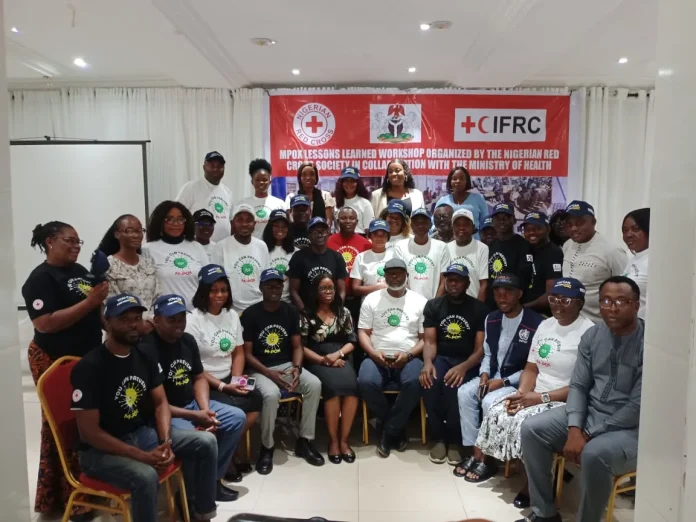By Jumai Nwachukwu/Ifeanyi Uwagwu
The Nigerian Red Cross Society with support from the International Federation of the Red Cross and Red Crescent Societies (IFRC) in collaboration with the Delta State Ministry of Health and the Nigeria Centre for Disease Control and Prevention (NCDC), has held a lessons-learned workshop in Asaba to review the implementation of its Mpox response strategy across the country.
The meeting, which took place at the Conference Hall of Golden Tulip Hotel, brought together key stakeholders at the forefront of tackling the zoonotic orthopoxvirus, formerly known as Monkeypox.
The workshop provided a platform for participants to share experiences and strengthen approaches to surveillance, case management, risk communication, and health promotion, to improve early detection and effective response to Mpox outbreaks.
Speaking at the event, Assistant Coordinator of Health and Care, Nigeria Red Cross Society, Ms Imoke Ikwo, described the workshop as a crucial step in assessing the Mpox intervention carried out nationwide. She explained that the programme encountered some challenges, but significant progress was made across the 23 states where the activities were implemented. In addition, health workers were trained across all 36 states and the Federal Capital Territory.
“Our focus was to educate communities on what Mpox is, how to identify suspected cases, how it spreads, and how to protect themselves,” Ikwor said. “We encouraged community members to refer anyone with symptoms to the nearest health facility immediately. The collaboration with government partners, especially the NCDC, was strong and consistent throughout the response.”
She mentioned that the intervention covered no fewer than five local government areas in each of the 23 target states, with some states recording even wider reach. Communities were selected based on evidence and reported cases, ensuring that resources were deployed strategically.
Ikwo commended the synergy between the Red Cross and the Delta State government, describing it as “smooth and exceptional.” She credited the proactive leadership of the Red Cross Delta State Branch Secretary/Chief Executive Officer, Mr. Charles Arinomor and the close working ties with the Ministry of Health and other stakeholders.
“Delta State is peculiar in the level of collaboration we enjoy. Our CEO is proactive, and the rapport with the Ministry of Health, the Primary Healthcare system, and relevant agencies is excellent. The presence of the State Epidemiologist here today is proof of this. Whether it’s disaster response or health intervention, the state always supports us,” she disclosed.
In her remarks, the Delta State Epidemiologist, Dr Mildred Okowa, stated that the workshop was essential to further re-strategise, share knowledge on successes and challenges for better operations and pathways for future collaborations.
Okowa revealed that the Delta State government was not resting on its oars to ensure that it tackles and sustains the tempo in tackling the disease, as the health and well-being of every Deltan is paramount to Governor Sheriff Oborevwori.
Adding further insight into the national outbreak situation, the National Incident Manager for Mpox at the NCDC, Dr Odianosen Ehiakhamen, said Nigeria had recorded 400 confirmed cases across 33 states and the Federal Capital Territory, currently, stating that only Yobe, Taraba, and Kogi states have not reported a confirmed case.
“Just recently, we had a confirmed case in Borno, and a few states, particularly in the southern part of the country, have accounted for more than 70 per cent of the confirmed cases so far,” Ehiakhamen disclosed. “With activities like this workshop, we are hopeful of improving case detection, sample collection, and reporting, as well as strengthening all the systems needed to identify epidemic-prone diseases.”
He highlighted some of the challenges facing Mpox surveillance, especially in rural communities. According to him, a bottom-up approach is essential, with greater emphasis on community involvement in reporting and early detection.
“It has been difficult for community healthcare workers and even for subnational governments,” he said. “Funding for active case search and contact tracing has been poor. Yet, despite these limitations, they have gone over and beyond to carry out much of the work. This is why the support from the Nigerian Red Cross in community surveillance is invaluable.”


